The Digital Voice Recorder Market is estimated to be valued at USD 2.4 billion in 2025 and is projected to reach USD 7.2 billion by 2035, registering a compound annual growth rate (CAGR) of 11.5% over the forecast period. This represents 39.6% of the total incremental growth over the 10-year forecast period. The early growth is driven by increasing demand for portable, high-quality recording devices in sectors such as education, healthcare, legal, and personal use. Advancements in voice recognition, storage capacity, and battery life are making digital voice recorders more attractive for professional and consumer applications alike.
The second half (2030–2035) will contribute USD 2.8 billion, representing 60.4% of the total growth, as the market continues to expand with the increasing adoption of AI-based voice transcription, cloud storage, and multi-functional devices. Annual increments in the first phase average USD 0.36 billion per year, while the later years will see stronger growth as the devices integrate more advanced technologies like voice control and smart features. Manufacturers focusing on premium features, portability, and advanced connectivity will capture the largest share of this USD 4.8 billion growth opportunity.
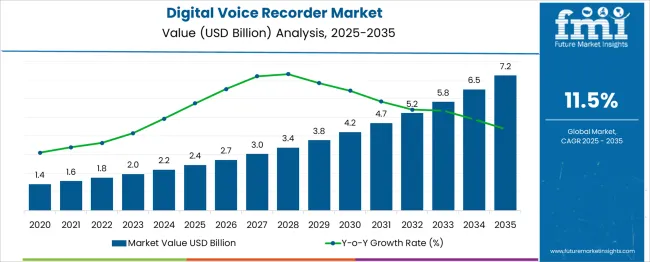
| Metric | Value |
|---|---|
| Digital Voice Recorder Market Estimated Value in (2025 E) | USD 2.4 billion |
| Digital Voice Recorder Market Forecast Value in (2035 F) | USD 7.2 billion |
| Forecast CAGR (2025 to 2035) | 11.5% |
The digital voice recorder market is gaining traction as evolving user requirements across professional, educational, and media sectors redefine the utility of voice-based data capture. Increasing dependence on clear and accurate audio recording for legal documentation, journalism, podcasting, and academic transcription has driven the adoption of advanced digital voice recorders with enhanced sound processing capabilities.
The shift from analog systems to compact digital alternatives has been accelerated by the integration of high-fidelity microphones, noise reduction algorithms, and compatibility with PC and cloud systems for seamless data transfer. Regulatory compliance in sectors like healthcare and law enforcement has also supported wider implementation of secure and tamper-proof recording solutions.
As voice-activated AI assistants, speech recognition tools, and real-time transcription platforms become more prevalent, the relevance of reliable voice input devices continues to grow. The market outlook remains optimistic as portable, energy-efficient, and high-capacity digital recorders become indispensable tools in documentation-heavy professions and remote content creation.
The digital voice recorder market is segmented by product type, capacity, battery type, end use, and geographic regions. By product type, the digital voice recorder market is divided into Handheld Voice Recorders, Wearable Voice Recorders, Desktop Voice Recorders, Pen-style Voice Recorders, and Others. In terms of capacity, the digital voice recorder market is classified into 8 GB to 16 GB, Below 4 GB, 4 GB to 8 GB, and Above 16 GB. Based on battery type, the digital voice recorder market is segmented into Rechargeable and Non-rechargeable.
The end use of the digital voice recorder market is segmented into Business Professionals, Journalists & Media, Education, Law Enforcement & Legal, Healthcare, and Personal Use Others. Regionally, the digital voice recorder industry is classified into North America, Latin America, Western Europe, Eastern Europe, Balkan & Baltic Countries, Russia & Belarus, Central Asia, East Asia, South Asia & Pacific, and the Middle East & Africa.
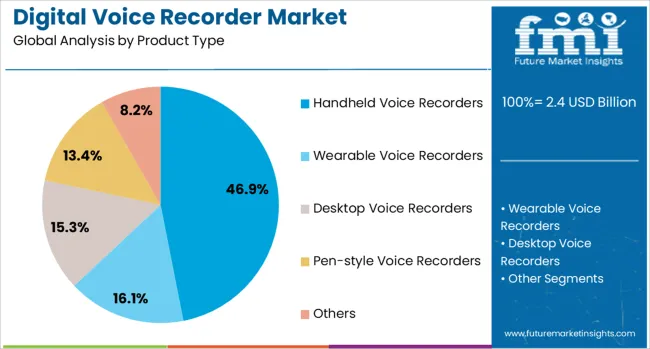
The handheld voice recorders segment is expected to account for 46.9% of the digital voice recorder market revenue share in 2025. This leading position has been influenced by the segment’s superior portability, ease of use, and strong appeal among professionals, journalists, and field researchers.
Handheld devices are being increasingly preferred due to their ergonomic design, integrated stereo microphones, and high audio resolution capabilities, all of which contribute to efficient voice capture in dynamic environments. The ability to store hours of recordings with minimal distortion and the presence of intuitive user interfaces have further improved usability across non-technical user groups.
Market penetration of handheld recorders has also grown with the inclusion of features such as voice activation, noise filtering, and encryption, making them suitable for secure and high-accuracy applications. Their consistent demand in education, business meetings, and investigative services is expected to sustain segment growth as real-time voice documentation becomes a more integral part of professional workflows.
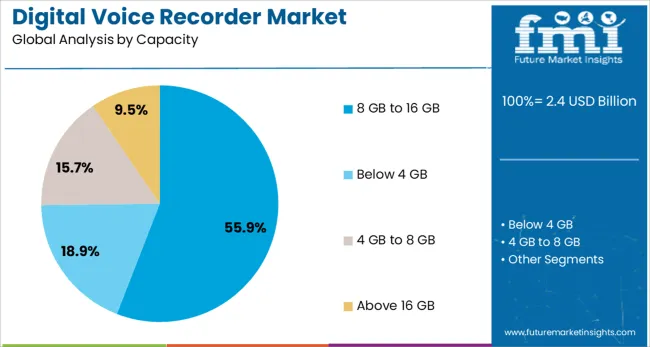
The 8 GB to 16 GB capacity range is projected to hold 55.9% of the market share in 2025, driven by its optimal balance of storage, cost, and portability. This segment's dominance is supported by its ability to accommodate extended audio recording sessions without frequent data transfers, making it highly suitable for professionals engaged in interviews, lectures, and legal proceedings.
Devices in this range offer sufficient storage for high-quality audio formats such as WAV and MP3 while maintaining affordable pricing, which has broadened their accessibility in both consumer and institutional applications. The integration of advanced compression algorithms and intuitive file management systems has further enhanced the utility of this capacity segment.
As demand for dependable mid-range storage options continues to grow among users requiring frequent recording and archiving, the 8 GB to 16 GB category remains well-positioned to serve as a reliable and cost-efficient choice across various end-use environments.
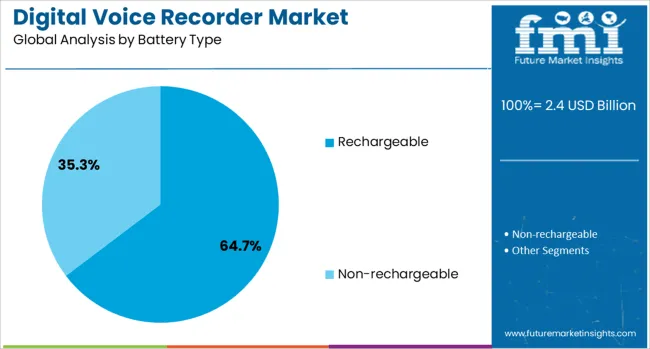
Rechargeable battery-powered digital voice recorders are anticipated to command 64.7% of the market share in 2025, reflecting strong user preference for sustainability, cost-efficiency, and uninterrupted operation. The rising demand for environmentally conscious and reusable power solutions has significantly favored the adoption of lithium-ion and lithium-polymer battery technologies in voice recording devices.
Rechargeable models are being increasingly preferred due to their long battery life, fast charging capabilities, and reduced dependence on disposable batteries, all of which support long-term use in field-intensive applications. Enhanced integration with USB-C and quick-charge interfaces has allowed for convenient recharging even in mobile settings, making them ideal for professionals working in journalism, healthcare, and academia.
Additionally, advancements in battery management systems and energy-efficient processors have improved device runtime and thermal stability. As operational uptime becomes a critical factor for users requiring extended recording durations, rechargeable options are expected to remain the preferred power solution across portable audio recording devices.
The digital voice recorder market is driven by increasing demand for efficient, portable audio recording devices across various sectors. Major growth drivers include the rise in remote work, content creation, and digital note-taking applications. Opportunities exist in the integration of cloud services and voice recognition features. Emerging trends involve the adoption of high-definition audio and compact designs. However, market restraints such as pricing pressure and competition from smartphone applications challenge broader market expansion.
The major growth driver in the digital voice recorder market is the increasing demand for portable and reliable audio recording devices, particularly in remote work and content creation. In 2024, more professionals and creators utilized voice recorders for meetings, interviews, and podcasts. This trend is expected to continue in 2025, as the need for efficient, high-quality audio documentation grows, further driving the market’s expansion in sectors such as business, education, and media.
Opportunities in the digital voice recorder market are arising from the integration of cloud services and voice recognition technology. In 2024, manufacturers began offering recorders with cloud synchronization capabilities, allowing users to store, share, and access files from multiple devices. Voice recognition is also gaining traction, enabling hands-free operation and transcription services, which further enhances productivity. These features are expected to boost market growth, especially in sectors requiring secure, seamless data management.
Emerging trends in the digital voice recorder market include the shift towards high-definition (HD) audio quality and more compact, user-friendly designs. By 2025, demand for HD audio in digital recorders is expected to grow, driven by the need for clear, precise sound in professional environments. Smaller, more ergonomic designs have also become popular, providing users with lightweight, portable options for on-the-go recording. These trends align with the evolving demands of both business and personal use cases.
Major market restraints in the digital voice recorder market include pricing pressure and competition from smartphones. In 2024, the availability of advanced voice recording capabilities in smartphones at lower price points limited the adoption of standalone digital voice recorders. Despite their specialized features, the higher cost of dedicated devices posed challenges for consumers, especially in developing markets. This competition from multifunctional smartphones is expected to continue limiting broader market adoption.
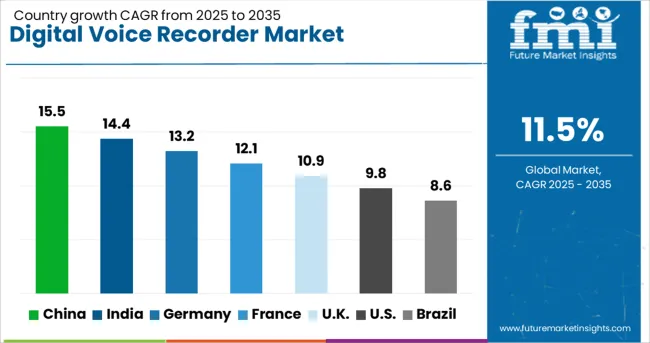
| Country | CAGR |
|---|---|
| China | 15.5% |
| India | 14.4% |
| Germany | 13.2% |
| France | 12.1% |
| UK | 10.9% |
| USA | 9.8% |
| Brazil | 8.6% |
The global digital voice recorder market is projected to grow at an 11.5% CAGR from 2025 to 2035. China leads with a growth rate of 15.5%, followed by India at 14.4%, and Germany at 13.2%. The United Kingdom records a growth rate of 10.9%, while the United States shows the slowest growth among the profiled markets at 9.8%. These differences in growth rates are largely driven by regional technological adoption, consumer demand for portable audio recording solutions, and the expansion of voice-driven applications across various sectors. Emerging markets like China and India are witnessing strong growth due to rising disposable incomes and increasing demand for personal and professional audio devices, while mature markets like the USA and the UK experience steady growth due to market saturation.
The digital voice recorder market in China is experiencing rapid growth, with a projected CAGR of 15.5%. The country’s growing middle class, increasing disposable incomes, and rising demand for portable and high-quality audio recording devices are key factors driving this market. China’s strong emphasis on digitalization, smart devices, and e-commerce also plays a major role in the adoption of digital voice recorders. Additionally, the increasing demand for voice-driven applications in education, business, and entertainment sectors is further contributing to the market’s expansion. The Chinese market is poised to remain the leader in digital voice recorder adoption.
The digital voice recorder market in India is projected to grow at a CAGR of 14.4%. India’s expanding middle class and increasing reliance on digital tools for work and education are significant drivers behind this growth. The demand for digital voice recorders in business, education, and entertainment sectors is increasing as more professionals and students turn to audio recording for meetings, lectures, and content creation. Additionally, India’s rising digital literacy, increasing smartphone usage, and growth in e-commerce platforms further support the expansion of the digital voice recorder market in the region.
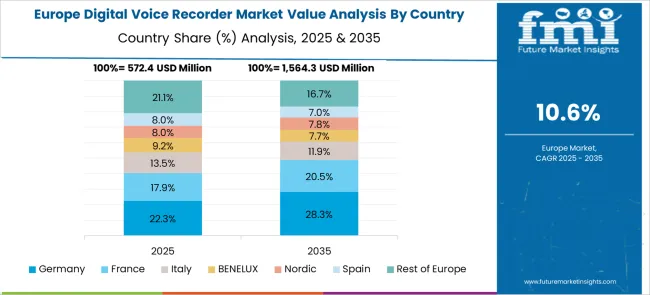
The digital voice recorder market in Germany is projected to grow at a CAGR of 13.2%. Germany’s advanced industrial and educational sectors, coupled with a strong interest in technology and precision, make it a key market for high-quality digital voice recorders. The demand for such devices is primarily driven by professionals, students, and content creators seeking reliable and portable audio recording solutions. Additionally, as Germany continues to push for digitalization in various sectors, including education, business, and healthcare, the adoption of digital voice recorders is expected to remain strong, particularly for official and personal use.
The digital voice recorder market in the United Kingdom is expected to grow at a CAGR of 10.9%. While the market in the UK is mature, steady demand for digital voice recorders continues due to the widespread use of these devices in education, business, and professional environments. With increasing reliance on digital tools for meetings, lectures, and interviews, the UK remains a key market for voice recording solutions. Additionally, the rise of voice-driven applications, such as voice assistants and transcription services, further contributes to market growth, though at a slower pace than emerging markets.
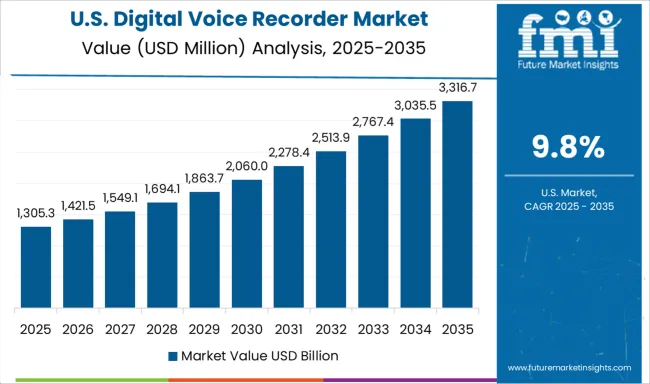
The digital voice recorder market in the United States is projected to grow at a CAGR of 9.8%. Despite being a mature market, steady demand for digital voice recorders persists, especially in business, education, and professional environments. The USA market is characterized by a high level of competition, with advanced voice recorders designed for specific use cases, such as legal, medical, and corporate sectors. Additionally, the growing reliance on voice assistants, transcription tools, and content creation applications supports the demand for portable and reliable digital voice recorders. While market growth is slower compared to emerging economies, the USA remains an essential market for high-end voice recording technologies.
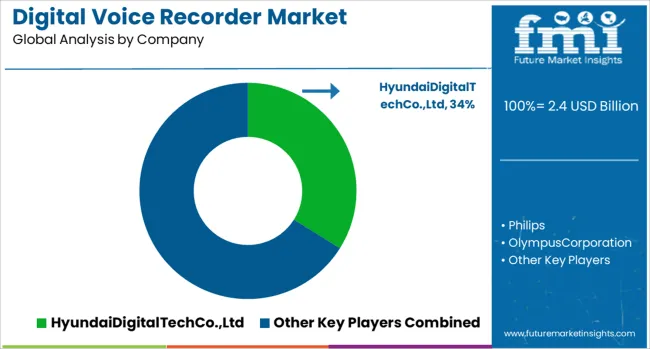
Companies such as Sony and Olympus dominate with well-established product portfolios and strong global distribution networks, ensuring their devices remain the preferred choice for professional users in media and education. Their focus on advanced audio processing, longer recording times, and compatibility with modern data management platforms creates high brand stickiness. Panasonic and Philips target both institutional and consumer segments, delivering ergonomic designs and models with strong battery efficiency, balancing reliability with competitive pricing. Zoom and Roland emphasize quality for creative professionals, developing models capable of multi-track recording and studio-grade fidelity, giving them a solid position in the creative production and content development segments.
Regional manufacturers, particularly in Asia-Pacific, are strengthening their footprint with cost-efficient devices that appeal to students, e-learning platforms, and entry-level buyers. Brands such as Shenzhen HNSAT are scaling quickly in markets where affordability is prioritized over advanced features, expanding the overall addressable market. Across the industry, strategies focus on four themes: innovation in sound clarity and recording endurance, seamless integration with digital transcription tools, broad channel reach spanning retail and e-commerce, and portfolio diversity to address professional and consumer price points. The competitive landscape is therefore defined by global leaders anchoring premium and professional demand, mid-tier players bridging affordability with reliability, and regional challengers capturing volume through aggressive pricing and localization.
| Item | Value |
|---|---|
| Quantitative Units | USD 2.4 Billion |
| Product Type | Handheld Voice Recorders, Wearable Voice Recorders, Desktop Voice Recorders, Pen-style Voice Recorders, and Others |
| Capacity | 8 GB to 16 GB, Below 4 GB, 4 GB to 8 GB, and Above 16 GB |
| Battery Type | Rechargeable and Non-rechargeable |
| End Use | Business Professionals, Journalists & Media, Education, Law Enforcement & Legal, Healthcare, Personal Use, and Others |
| Regions Covered | North America, Europe, Asia-Pacific, Latin America, Middle East & Africa |
| Country Covered | United States, Canada, Germany, France, United Kingdom, China, Japan, India, Brazil, South Africa |
| Key Companies Profiled | HyundaiDigitalTechCo.,Ltd, Philips, OlympusCorporation, and ZoomCorp. |
| Additional Attributes | Dollar sales by recorder type and application, demand dynamics across personal, professional, and healthcare sectors, regional trends in digital voice recorder adoption, innovation in storage capacity, noise cancellation, and transcription technologies, impact of regulatory standards on data privacy, and emerging use cases in AI-driven voice recognition and automated transcription services. |
The global digital voice recorder market is estimated to be valued at USD 2.4 billion in 2025.
The market size for the digital voice recorder market is projected to reach USD 7.2 billion by 2035.
The digital voice recorder market is expected to grow at a 11.5% CAGR between 2025 and 2035.
The key product types in digital voice recorder market are handheld voice recorders, wearable voice recorders, desktop voice recorders, pen-style voice recorders and others.
In terms of capacity, 8 gb to 16 gb segment to command 55.9% share in the digital voice recorder market in 2025.






Our Research Products

The "Full Research Suite" delivers actionable market intel, deep dives on markets or technologies, so clients act faster, cut risk, and unlock growth.

The Leaderboard benchmarks and ranks top vendors, classifying them as Established Leaders, Leading Challengers, or Disruptors & Challengers.

Locates where complements amplify value and substitutes erode it, forecasting net impact by horizon

We deliver granular, decision-grade intel: market sizing, 5-year forecasts, pricing, adoption, usage, revenue, and operational KPIs—plus competitor tracking, regulation, and value chains—across 60 countries broadly.

Spot the shifts before they hit your P&L. We track inflection points, adoption curves, pricing moves, and ecosystem plays to show where demand is heading, why it is changing, and what to do next across high-growth markets and disruptive tech

Real-time reads of user behavior. We track shifting priorities, perceptions of today’s and next-gen services, and provider experience, then pace how fast tech moves from trial to adoption, blending buyer, consumer, and channel inputs with social signals (#WhySwitch, #UX).

Partner with our analyst team to build a custom report designed around your business priorities. From analysing market trends to assessing competitors or crafting bespoke datasets, we tailor insights to your needs.
Supplier Intelligence
Discovery & Profiling
Capacity & Footprint
Performance & Risk
Compliance & Governance
Commercial Readiness
Who Supplies Whom
Scorecards & Shortlists
Playbooks & Docs
Category Intelligence
Definition & Scope
Demand & Use Cases
Cost Drivers
Market Structure
Supply Chain Map
Trade & Policy
Operating Norms
Deliverables
Buyer Intelligence
Account Basics
Spend & Scope
Procurement Model
Vendor Requirements
Terms & Policies
Entry Strategy
Pain Points & Triggers
Outputs
Pricing Analysis
Benchmarks
Trends
Should-Cost
Indexation
Landed Cost
Commercial Terms
Deliverables
Brand Analysis
Positioning & Value Prop
Share & Presence
Customer Evidence
Go-to-Market
Digital & Reputation
Compliance & Trust
KPIs & Gaps
Outputs
Full Research Suite comprises of:
Market outlook & trends analysis
Interviews & case studies
Strategic recommendations
Vendor profiles & capabilities analysis
5-year forecasts
8 regions and 60+ country-level data splits
Market segment data splits
12 months of continuous data updates
DELIVERED AS:
PDF EXCEL ONLINE
Digital Fault Recorders (DFR) Market Size and Share Forecast Outlook 2025 to 2035
Digital Hall Effect Gaussmeter Market Size and Share Forecast Outlook 2025 to 2035
Digital Group Dining Service Market Size and Share Forecast Outlook 2025 to 2035
Digital Pathology Displays Market Size and Share Forecast Outlook 2025 to 2035
Digital Rights Management Market Size and Share Forecast Outlook 2025 to 2035
Digital Liquid Filling Systems Market Size and Share Forecast Outlook 2025 to 2035
Digital Transformation Industry Analysis in MENA Size and Share Forecast Outlook 2025 to 2035
Digital X-Ray Equipment Market Size and Share Forecast Outlook 2025 to 2035
Digital Marketing Analytics Industry Analysis in Latin America Forecast Outlook 2025 to 2035
Digital Health Market Forecast and Outlook 2025 to 2035
Digital Pen Market Forecast and Outlook 2025 to 2035
Digital X-ray Market Size and Share Forecast Outlook 2025 to 2035
Digital Elevation Model Market Size and Share Forecast Outlook 2025 to 2035
Digital Pump Controller Market Size and Share Forecast Outlook 2025 to 2035
Digital Textile Printing Market Size and Share Forecast Outlook 2025 to 2035
Digital Printing Paper Market Size and Share Forecast Outlook 2025 to 2035
Digital Battlefield Market Size and Share Forecast Outlook 2025 to 2035
Digital Product Passport Software Market Size and Share Forecast Outlook 2025 to 2035
Digital Lending Platform Market Size and Share Forecast Outlook 2025 to 2035
Digital Shipyard Market Size and Share Forecast Outlook 2025 to 2035

Thank you!
You will receive an email from our Business Development Manager. Please be sure to check your SPAM/JUNK folder too.
Chat With
MaRIA